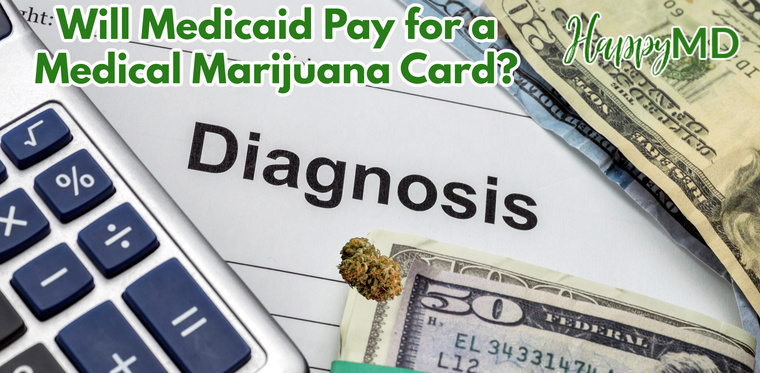
Check Out if Medicaid Will Pay for a Medical Marijuana Card?
Medical cannabis is become more prominently used in the healthcare system. More than 4 million patients have a medical marijuana card in the 35 states where it is legal. There are many benefits of medical cannabis, which also add to the demand.
However, insurance will not be able to cover the cost of your medical marijuana card. Many health insurance providers are yet to provide a medical card program.
The good news is that if you suffer from a severe health condition, your cannabis-based medication can qualify for Medicaid coverage. However, you are required to add the optional prescription drug plan to take advantage of the medical coverage.
What exactly will be covered? What will be paid for, and what will you not be reimbursed? These are some of the things that we cover in the following sections.
What’s Considered Medical Marijuana?
This is also known as medical cannabis, and the patients that have a medical marijuana card are allowed to make use of cannabinoids such as THC and CBD legally. This is only applicable when the patient is using the cannabis for the treatment of medical conditions like:-
- Multiple sclerosis
- Epilepsy
- Inflammation and pain
- Nausea and loss of appetite
Based on the location where you live at the moment, your state might allow for the use of medical marijuana for other conditions. Additionally, several states have very few conditions that are needed to qualify for a medical marijuana card. As such, you will not have a problem getting a card in these states.
Is Medical Marijuana Legal?
Medical marijuana is entirely legal in several states across the US. You must look at the list of qualifications that pertain to your particular state to know the conditions that will make you eligible for a marijuana card.
The Benefits of Medical Cannabis
Plenty of research has been conducted to delve into the benefits of medical marijuana, and one of the main reasons that patients used it was for the treatment of pain. This includes menstrual pain, injury pain, and cancer treatment pain.
The second primary reason people turn to the use of medical marijuana is movement disturbances such as those associated with Parkinson’s. The final reason people were required to have a medical marijuana card was vomiting and nausea.
People were applying to be allowed to use marijuana for medical reasons. Marijuana is known to deal with these symptoms quite effectively, and as such, the patient can have an easier time when they have such symptoms, and they can also get over such episodes more comfortably.
Drawbacks to Using Medical Marijuana
Cannabis, like any other form of medication, has several drawbacks and side effects that are associated with its use.
These are usually mild and include feelings of dizziness and drowsiness. The side effects are minor and will not last for a long time. They are temporary and will only appear for a while as the effect of the weed gets to the areas targeted by the cannabis treatment.
The patient will usually be required to find a place to sit for a while upon taking medication or even sleep for a few minutes to enable the side effects to pass before they can resume their usual activities and movements.
Why Medicaid Won’t Cover your Medical Marijuana Card
Since Medicare and Medicaid are federal programs and cannabis is still illegal under federal law, these programs will not cover the cost of your medical marijuana card. However, it is still possible to opt for the prescription drugs benefit available with the insurance covers.
When you opt for this coverage, there are several exceptional circumstances where cannabis treatment will be covered, but the insurance program will not cover the cost of getting a medical marijuana card.
Medicaid Benefits Explained
By law, states are usually required to provide Medicaid plans to individuals with low income. The healthcare packages have some benefit plans that must be offered in all states. Some of the benefits include:-
- Inpatient and outpatient services
- Home health services
- Physician visits
- Lab and x-ray services
- Family planning services
Other optional benefits can be added to your Medicaid plan in certain states, such as occupational therapy, physical therapy, optometry, dental and podiatry benefits. You can also get covered for prescriptions, and this will include all the marijuana-related medication that the FDA has approved.
Cannabis Treatments Medicaid Will Cover
Medicaid will cover several treatments. They include:-
Dronabinol
This comes under Syndros and Marinol's brand names and helps with nausea and vomiting. The FDA has approved it for people with AIDS and those undergoing cancer treatment. The drug is known to reduce wasting and stimulate appetite in patients. The drug contains synthetic THC and has been legal since 1970.
Epidiolex
The FDA approved this drug in 2018. The prescription is essential for preventing seizures and effective against childhood epilepsy and treating other forms of epileptic attacks.
How to Get Your Medical Marijuana Card
Applying for the marijuana card is a process which is simple and convenient. You can do it all online with a virtual consultation with a doctor who will fill out the recommendation for you and get the medical marijuana card you need in less time. With the online consultation, you will make the application faster, and you will not have to go through a lot to get the card.
References
1. https://www.healthline.com/health/medicare/does-medicare-cover-medical-marijuana
2. https://www.health.ny.gov/regulations/medical_marijuana/
3. https://www.nj.gov/health/medicalmarijuana/pat_faqs.shtml
4. https://www.bernardcannabiscenter.com/will-medicaid-or-medicare-cover-medical-marijuana


.png)